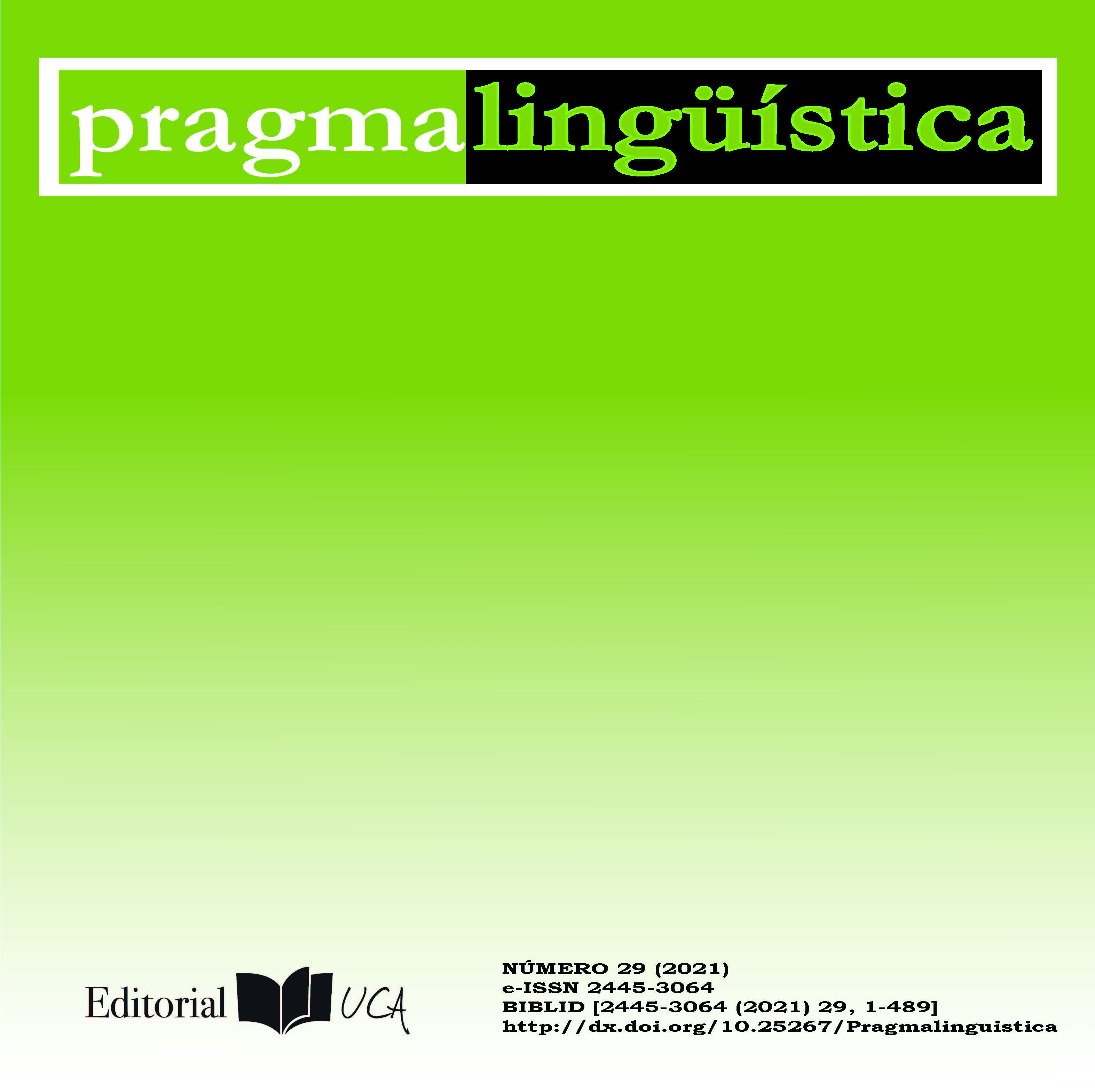La polémica lingüística como tipología discursiva en la prensa española del siglo XIX. Los discursos polémicos de Fernando Gómez de Salazar

DOI
https://doi.org/10.25267/Pragmalinguistica.2021.i29.09Información
Resumen
La polémica lingüística es una tipología discursiva poco analizada en los estudios lingüísticos, a pesar de que, a lo largo del siglo XIX, alcanza un amplio desarrollo en las páginas de la prensa española, que se convierte en el espacio de opinión pública preferente donde intelectuales, maestro y lingüistas debaten sus ideas en torno a la lengua y su enseñanza. Los objetivos concretos de este trabajo consisten en a) destacar la importancia de la prensa española del siglo XIX en el desarrollo de estos debates sobre la lengua; b) analizar la polémica lingüística como tipología discursiva, estableciendo su estructura, concepción y trascendencia en el intercambio y desarrollo de ideas lingüísticas en la época, y c) estudiar la figura de uno de estos polemistas incansables, Fernando Gómez de Salazar, que pretendemos poner en valor a partir del análisis de algunas de sus controversias más destacadas en la prensa.
Palabras clave
Descargas
Agencias de apoyo
Cómo citar
Licencia
Derechos de autor 2021 Victoriano Gaviño Rodríguez

Esta obra está bajo una licencia internacional Creative Commons Atribución-NoComercial-SinDerivadas 4.0.
Citas
ACADEMIA DE PROFESORES DE PRIMERA EDUCACIÓN (1844): Sesión celebrada el día 3 de octubre de 1844, en el Salón del Instituto Español, por la Academia de profesores de primera educación, para demostrar las ventajas que ofrece la reforma de ortografía adoptada y publicada por la misma Academia, Madrid: Imprenta de D.ª Francisca Estevan.
AMOSSY, R. (2010): “L’argomento 'ad hominem': riflessioni sulle funzioni della violenza verbale”, Altre Modernità, 3, pp. 56-70.
AMOSSY, R. (2014): Apologie de la polémique, Paris: Puff.
CABALLERO, Mª M. (1992): “Las polémicas lingüísticas durante el siglo XIX”, Cuadernos hispanoamericanos 500, pp. 177-188.
DURÁN LÓPEZ, F. (2016): “Andrés Bello contra José Joaquín de Mora en veintisiete palabras: una polémica chilena en 1830”, Durán López, F. & Gaviño Rodríguez, V. (eds.): Estudios sobre filología española y exilio en la primera mitad del siglo XIX, Madrid: Visor Libros, pp. 503-536.
EZPELETA AGUILAR, F. (2015-2016): “La prensa pedagógica del XIX como fuente para historiar la didáctica de la lengua”, Ianua. Revista Philologica Romanica, 15-16, pp. 159-171.
GÓMEZ DE SALAZAR, F. (1869): Gramática de la lengua castellana, Madrid: Imprenta de F. Escámez.
GÓMEZ DE SALAZAR, F. (1870): Compendio de la gramática de la lengua española, Madrid: J. M. Lapuente.
GÓMEZ DE SALAZAR, F. (1871): Juicio crítico del Diccionario y de la Gramática últimamente publicados por la Academia Española exponiendo los muchos y gravísimos errores que ambas obras contienen, Madrid: Gregorio Fuste.
GÓMEZ DE SALAZAR, F., CONDOMINES, F. de A. & BOSCH, M. (1872): La neografía. Polémica sobre reformas ortográficas entre los señores Gómez de Salazar, Condomines y Bosch, Palma: Imprenta de Pedro José Gelabert.
GÓMEZ DE SALAZAR, F. (1873): Conjugación completa de todos los verbos irregulares castellanos, y de los defectivos en los tiempos y personas que están en uso, Madrid: J. M. Lapuente.
GÓMEZ DE SALAZAR, F. (¿1878?): La ortografía al alcance de todos: método novísimo teórico-práctico para aprender por sí con la mayor facilidad esta importante materia los niños, mujeres y hombres, aunque no tengan conocimientos gramaticales, Madrid: Gregorio Juste.
KERBRAT-ORECCHIONI, C. (1980): Le discours polémique, Lyon: Presses Universitaires de Lyon.
MAINGUENEAU, D. (1983): Sémantique de la polémique, Lausanne: L’âge d’homme.
MONTERO, A. S. (2016): El análisis del discurso polémico. Disputas, querellas y controversias, Buenos Aires: Prometeo.
QUILIS MERÍN, M. (2014): “La Academia Literaria i Zientífica de Instruczion Primaria: defensa razonada (y apasionada) de su ortografía filosófica en 1844”, Battaner Moro, E., Calvo Fernández, V. & y Peña Jiménez, P. (eds.): Historiografía lingüística: líneas actuales de investigación, Volumen II, Münster: Nodus Publikationen, pp. 607-616.
ROUX, P. (2013): “Lire le texte polémique: violence du discours et plaisir de la lecture”, Recherches & Travaux, 83, pp. 25-39.
VERÓN, E. (1987): “La palabra adversativa. Observaciones sobre la enunciación política”, Verón, E., Arfuch, L., Chirico, Mª M., Ipola, E. de, Goldman, N., González Bombal, M. I. & Landi, Ó.: El discurso político. Lenguajes y acontecimientos, Buenos Aires: Hachette, pp. 11-26.
VILLALAÍN BENITO, J. L. (1997): Manuales escolares en España. Tomo I. Legislación (1812-1939), Madrid: UNED.
WOOLARD, K. A. (1998): “Introduction: Language Ideology as a Field of Inquiry”, Schieffelin, B. B., Woolard, K. A. & Kroskrity, P. V. (eds.): Language Ideologies. Practice and theory, New York/Oxford: Oxford University Press, pp. 3-47.
WOOLARD, K. A. & SCHIEFFELIN, B. B. (1994): “Language Ideology”, Annual Review of Anthropology, 23, pp. 55-82.






